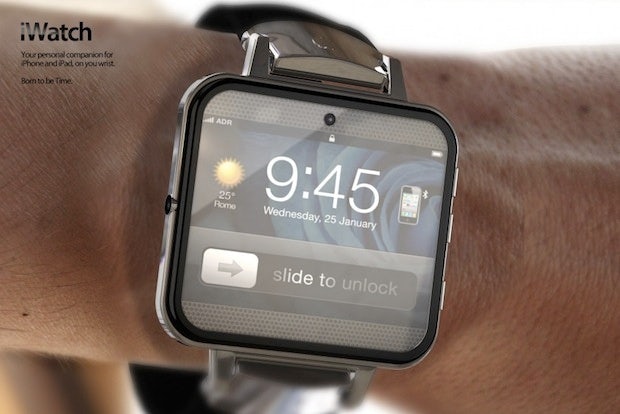
A rendering which provides a guess about what the new iWatch may look like. (International Digital Times)
The media has been avidly following Apple’s global iWatch trademark buying spree in recent months as the company files for the name of the prospective product across the world, most recently hitting Taiwan and Japan in Asia.
However, the company hasn't filed for a trademark in China yet, the brand’s second biggest market, possibly because of fears of legal trouble over copyright issues after it was reported in The Beijing News that other Chinese companies have trademarked the name. Although this predicament is all-too-common when it comes to trademarks in China, the actual iWatch-related trademarks in this case appear to pose little threat. Furthermore, Apple is no stranger to legal copyright issues in China, and they certainly have not stopped the company in the past.
Although the media has been portraying this issue as a brewing legal controversy, all registered trademarks of “iWatch” have expired. Taiwanese company Chowsons International holds onto the trademark for “iWatching” under “computer peripheral” devices, which is the registered name closest to something that might result in a legal issue. According to the South China Morning Post:
“Because ‘iWatch’ and ‘iWatching’ are similar, if Apple decides to file iWatch under the ‘computer peripherals’ category in their [China] trademark application, they may run into some troubles,” [Shanghai-based lawyer surnamed] Gou reportedly said.
Legal battles over companies holding copyright to foreign brand names are not uncommon in China, and certainly not to Apple, which is embroiled in a lawsuit started by Chinese company Zhizhen Network Technology for its iPhone 4 Siri technology.
The approach that Apple will likely take regarding this new dilemma will probably be the same as it has done before: forge ahead, make an enormous profit, and pay whatever legal fees result, if there even are any. So far, the profit benefits have undoubtedly overshadowed the cost of any legal troubles in China when it comes to copyright. The company previously used this strategy in dealing with a legal battle with the Shenzhen branch of Proview Technology over the “iPad” trademark, when it settled for a mere RMB60 million, a fraction of Apple's overall China profits.
Outside of the tech realm, fashion label 3.1 Philip Lim also recently creatively solved a China copyright scuffle when it proactively made an entire new China logo for itself when a Chinese company held the rights to its trademark. This solution obviously would not work for branding-focused Apple, but demonstrates the proactive ways in which some brands choose to deal with China's tricky business landscape.
While the iWatch copyright issue won't keep the company away from the China market, Apple certainly has bigger things to worry about in terms of the government's hopes to encourage domestic industry. Despite receiving an indirect product endorsement from China's fashionable first lady Peng Liyuan, the Chinese government has Apple in its crosshairs after embarking on a major anti-Apple CCTV campaign and subsequently continuing to write stories attempting to discredit the brand. Although China's savvy citizens may not necessarily believe the propaganda, it will certainly have to face off against a host of both domestic and international competitors in the years to come.